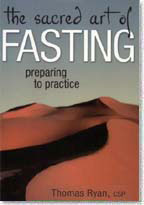 Thomas Ryan’s book The Sacred Art Of Fasting: Preparing to Practice will help you to open your mind and heart and discover how the sacred art of fasting can strengthen your spiritual appetite.
Thomas Ryan’s book The Sacred Art Of Fasting: Preparing to Practice will help you to open your mind and heart and discover how the sacred art of fasting can strengthen your spiritual appetite.
According to Ryan:
Fasting as a religious act increases our sensitivity to that mystery always and everywhere present to us…. It is an invitation to awareness, a call to compassion for the needy, a cry of distress, and a song of joy. It is a discipline of self-restraint, a ritual of purification, and a sanctuary for offerings of atonement. It is a wellspring for the spiritually dry, a compass for the spiritually lost, and inner nourishment for the spiritually hungry. —from chapter 9
Though fasting is practiced in some form by nearly every faith tradition throughout the world, it is often seen as scary or something only for monastic life. But fasting doesn’t have to be intimidating. And it doesn’t have to mean going weeks without food.
The Sacred Art of Fasting invites you to explore the practical approaches, spiritual motivations, and physical benefits of this ancient practice by looking at the ways it is observed in several faith traditions. Inspiring personal reflections, helpful advice, and encouragement from people who practice fasting answer your questions, allay your fears, and reveal how you too can safely incorporate fasting into your spiritual life.
Written by a Catholic priest and author of eight other books, this is an accessible, thoughtful treatment of the common spiritual practice of fasting. For an era characterized by obesity and overindulgence, this study offers a refreshing reminder that religion invites us to temperance; as Ryan puts it, “the body tolerates a fast far better than a feast.”
Ryan explores both the physical and spiritual benefits of fasting with an emphasis on the religious grounds for fasting, including purification, repentance, mourning, rejoicing, self-discipline, remembering and prioritizing God, almsgiving, social solidarity and more. One of the book’s strengths is its evenhanded introduction to each of the six religions it covers (Judaism, Christianity, Islam, Hinduism, Buddhism and Mormonism) and the inclusion in each chapter of a “living voice from the tradition.”
These narratives allow adherents from each religion to speak from their own belief and experience, and they range in style from simple exposition to personal essay and interview format. The chapter on Christianity is slightly partial toward the author’s own Catholicism, but the principles it explores are broadly inclusive. Another gem is the chapter with suggestions for keeping the spirit of a fast even if actual abstention is not physically possible for health reasons. This is a much-needed treatise that will attract believers from all faiths.
Author: Thomas Ryan
Year of Release: 2005